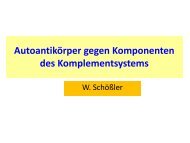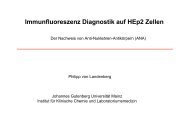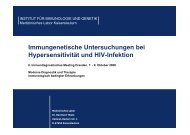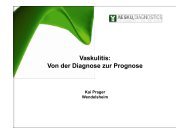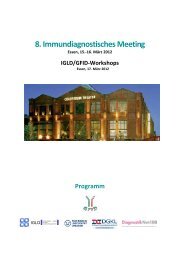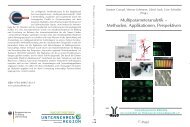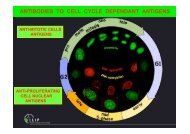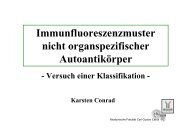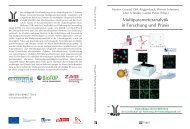9TH DresDen symposium on AuToAnTiboDies - (GFID) eV
9TH DresDen symposium on AuToAnTiboDies - (GFID) eV
9TH DresDen symposium on AuToAnTiboDies - (GFID) eV
You also want an ePaper? Increase the reach of your titles
YUMPU automatically turns print PDFs into web optimized ePapers that Google loves.
9 TH <str<strong>on</strong>g>DresDen</str<strong>on</strong>g><br />
<str<strong>on</strong>g>symposium</str<strong>on</strong>g> <strong>on</strong><br />
<strong>AuToAnTiboDies</strong><br />
<str<strong>on</strong>g>DresDen</str<strong>on</strong>g>, sepTember 2–5, 2009<br />
FinAl progrAmme<br />
www.gfid-ev.de
Karsten C<strong>on</strong>rad, Werner Schößler, Falk Hiepe, Marvin J. Fritzler<br />
Autoantibodies in Systemic<br />
Autoimmune Diseases<br />
A Diagnostic Reference<br />
Marvin J. Fritzler<br />
Autoantibodies in Systemic Autoimmune<br />
Diseases –<br />
ADiagnosticReference<br />
sec<strong>on</strong>d Editi<strong>on</strong><br />
Pabst Science Publishers, 2007<br />
ISBN 978-3-89967-420-0<br />
2nd editi<strong>on</strong><br />
Karsten C<strong>on</strong>rad, Werner Schößler, Falk Hiepe,<br />
AUTOANTIGENS, AUTOANTIBODIES, AUTOIMMUNITY<br />
Volume 2, sec<strong>on</strong>d Editi<strong>on</strong> – 2007<br />
PABST<br />
Autoantibodies are a very heterogeneous group<br />
of antibodies with respect to their specificity, inducti<strong>on</strong>,<br />
effects, and clinical significance.Testing<br />
for autoantibodies can be helpful or necessary<br />
for the diagnosis, differential diagnosis,prognosticati<strong>on</strong>,<br />
or m<strong>on</strong>itoring of autoimmune diseases.<br />
In case of limited (forme fruste) disease or a single disease manifestati<strong>on</strong>, the detecti<strong>on</strong><br />
of serum autoantibodies can play an important role in raising the suspici<strong>on</strong><br />
of evolving disease and forecasting prognosis. This book and reference guide is<br />
intended to assist the physician in understanding and interpreting the variety of<br />
autoantibodies that are being used as diagnostic and prognostic tools for patients<br />
with systemic rheumatic diseases. Autoantibodies observed in systemic autoimmune<br />
diseases are described in alphabetical order in Part 1 of this reference guide.<br />
In Part 2, systemic autoimmune disorders as well as symptoms that indicate the<br />
possible presence of an autoimmune disease are listed. Systemic manifestati<strong>on</strong>s<br />
of organ-specific autoimmunediseaseswillnotbecoveredinthisvolume.Guide<br />
marks were inserted to ensure fast and easy cross-reference between symptoms, a<br />
given autoimmune disease and associated autoantibodies.Although the landscape<br />
of autoantibody testing c<strong>on</strong>tinues to change, this informati<strong>on</strong> will be a useful and<br />
valuable reference for many years to come.<br />
Gesellschaft zur Förderung der Immundiagnostik e.V.<br />
Dresden<br />
http://www.<strong>GFID</strong>-<strong>eV</strong>.de
WelCome<br />
Dear Colleagues,<br />
<strong>on</strong> behalf of the organizing Committee it is a great pleasure<br />
to welcome you to the 9th Dresden <str<strong>on</strong>g>symposium</str<strong>on</strong>g> <strong>on</strong><br />
Autoantibodies.<br />
The <str<strong>on</strong>g>symposium</str<strong>on</strong>g> is organised by the institute of immunology<br />
of the medical Faculty of the Technical university Dresden<br />
and the “gesellschaft zur Förderung der immundiagnostik<br />
e.V.“ (society for the Advancement of immune Diagnostics).<br />
The goal is to bring together clinicians and scientists specialising<br />
in "autoimmunology" to exchange academic informati<strong>on</strong><br />
and to present and discuss the results of basic and<br />
applied research <strong>on</strong> autoantigens, autoantibodies and autoimmunity.<br />
in the spectrum of immunological diseases affecting various<br />
organs by inflammati<strong>on</strong> and/or fibrosis, autoimmune reacti<strong>on</strong>s<br />
play an important role. based <strong>on</strong> different studies both<br />
in humans as well as in animal models it becomes obvious<br />
that there is a broad range of pathologies that involve not<br />
<strong>on</strong>ly “primary“ autoimmune reacti<strong>on</strong>s but also other pathogenic<br />
mechanisms such as postinfectious and autoinflammatory<br />
processes. The heterogeneity within the immunological<br />
diseases may reflect the variable expressi<strong>on</strong> of autoinflammatory,<br />
autoimmune, and up to now unknown factors<br />
in disease development and manifestati<strong>on</strong>. The current<br />
Dresden <str<strong>on</strong>g>symposium</str<strong>on</strong>g> <strong>on</strong> Autoantibodies entitled “From<br />
pathogenesis to Therapy of Autoimmune diseases“ will<br />
focus <strong>on</strong> different aspects of the pathogenesis of autoimmune<br />
and autoimmune-like diseases, the detecti<strong>on</strong> of novel<br />
and the relevance of esoteric autoantibodies, and biological<br />
therapies. The clarificati<strong>on</strong> of the etiopathological mechanisms<br />
is required to optimize prophylaxis, diagnostics and<br />
therapy of autoimmune diseases. especially, the applicati<strong>on</strong><br />
of novel and designer biological therapies needs a better<br />
understanding of the processes that are involved in the<br />
genesis of immunological diseases. some findings of the<br />
role of epigenetic mechanisms and innate immunity in the<br />
3
WelCome<br />
pathogenesis of autoimmune diseases may offer novel prophylactic<br />
and therapeutic strategies. regardless of the<br />
underlying pathology, disease-associated autoantibodies<br />
are important biomarkers for the vast majority of n<strong>on</strong>-organ<br />
and organ specific autoimmune diseases. However, to<br />
improve our understanding of these diseases and serological<br />
diagnostics it is necessary to search for novel autoantibodies,<br />
to further evaluate the real clinical relevance of<br />
known autoantibodies and to further develop and standardize<br />
the detecti<strong>on</strong> methods. The current <str<strong>on</strong>g>symposium</str<strong>on</strong>g> highlights<br />
novel insights into the immune dysregulati<strong>on</strong>, pathogenesis,<br />
serological diagnostics and biological therapies of<br />
autoimmune diseases with the main focus <strong>on</strong> rheumatoid<br />
arthritis, systemic lupus erythematosus, and autoimmune<br />
neurological diseases.<br />
We would like to express our thanks to the members of the<br />
internati<strong>on</strong>al Advisory board and to the active c<strong>on</strong>tributers<br />
who will present their latest achievements as well as to the<br />
many sp<strong>on</strong>sors who enabled this <str<strong>on</strong>g>symposium</str<strong>on</strong>g>. We expect<br />
that our 9th Dresden <str<strong>on</strong>g>symposium</str<strong>on</strong>g> <strong>on</strong> Autoantibodies will stimulate<br />
a broad debate how the new achievements from the<br />
bench work could help to improve diagnostics and therapy<br />
of autoimmune diseases. We hope that you will enjoy the<br />
scientific programme and your stay in Dresden.<br />
With best wishes,<br />
Karsten C<strong>on</strong>rad<br />
<strong>on</strong> behalf of the organizing Committee<br />
4
WeDnesDAy<br />
sepTember 02<br />
Registrati<strong>on</strong><br />
Welcome and Introducti<strong>on</strong><br />
THE SPECTRUM AND PATHOGENESIS<br />
OF NONINFECTIOUS INFLAMMATORY<br />
AND SCLEROSING DISEASES<br />
Co-Chairs: K. C<strong>on</strong>rad (Dresden, germany)<br />
p. v<strong>on</strong> landenberg (olten, switzerland)<br />
12.00–14.15<br />
14.15–14.30<br />
14.30–16.00<br />
The autoimmune – autoinflammatory c<strong>on</strong>tinuum<br />
Michael McDermott (Leeds, UK)<br />
14.30–15.00<br />
Autoimmune pancreatitis and igg4-related sclerosing<br />
diseases<br />
Terumi Kamisawa (Tokyo, Japan)<br />
15.00–15.30<br />
Autoallergy – chr<strong>on</strong>ic inflammati<strong>on</strong> by ige autoreactivity<br />
Rudolf Valenta (Vienna, Austria)<br />
15.30–16.00<br />
CoFFee breAK – posTer AnD eXHibiTi<strong>on</strong> VieWing<br />
16.00–16.40<br />
BIOLOGICAL THERAPY<br />
OF AUTOIMMUNE DISEASES I<br />
Co-Chairs: g. steiner (Vienna, Austria)<br />
C. Chizzolini (geneva, switzerland)<br />
16.40–18.30<br />
Advances in targeted therapies<br />
Joseph Smolen (Vienna, Austria)<br />
16.40–17.20<br />
The role of b cells in immunoregulati<strong>on</strong><br />
Elias Toubi (Haifa, Israel)<br />
17.20–17.50<br />
5
WeDnesDAy<br />
sepTember 02<br />
17.50–18.15<br />
18.15–18.30<br />
Targeting of memory plasma cells as therapeutic opti<strong>on</strong><br />
in autoimmune diseases<br />
Falk Hiepe (Berlin, Germany)<br />
* peptide-based immunotherapy of dilated cardiomyopathy<br />
in a lewis rat model<br />
Vladimir Kocoski (Würzburg, Germany)<br />
18.45<br />
Welcome Recepti<strong>on</strong><br />
6
THursDAy<br />
sepTember 03<br />
PATHOGENETIC ASPECTS<br />
OF AUTOIMMUNE DISEASES<br />
Co-Chairs: F. Hiepe (berlin, germany)<br />
e. Toubi (Haifa, israel)<br />
08.30–10.00<br />
The mosaic of autoimmunity – Autoantibodies, predicti<strong>on</strong><br />
and therapy<br />
Yehuda Shoenfeld (Tel-Hashomer, Israel)<br />
08.30–09.00<br />
The mosaic of the etiopathogenesis of sle –<br />
role of chromatin binding autoantibodies<br />
Martin Herrmann (Erlangen, Germany)<br />
09.00–09.30<br />
A mutati<strong>on</strong> in TreX1 that impairs susceptibility<br />
to granzyme A mediated cell death causes familial<br />
chilblain lupus<br />
Min Ae Lee-Kirsch (Dresden, Germany)<br />
09.30–09.45<br />
* Antiphospholipid antibodies affect the process<br />
of angiogenesis: novel mechanism of placental damage<br />
Silvia d’Ippolito (Rome, Italy)<br />
09.45–10.00<br />
CoFFee breAK – posTer AnD eXHibiTi<strong>on</strong> VieWing<br />
10.00–10.45<br />
poster viewing<br />
P1-P7 novel autoantibodies<br />
P8-P11 methodical aspects<br />
P12-P13 Therapy<br />
7
THursDAy<br />
sepTember 03<br />
10.45–12.30<br />
THE ROLE OF EPIGENETICS AND INNATE<br />
IMMUNITY IN THE PATHOGENESIS<br />
OF AUTOIMMUNE DISEASES<br />
Co-Chairs: e.K.l. Chan (gainesville, usA)<br />
m. Herrmann (erlangen, germany)<br />
10.45–11.15<br />
epigenetic mechanisms in the inducti<strong>on</strong> and aggravati<strong>on</strong><br />
of autoimmunity<br />
Olga Sánchez-Pernaute (Madrid, Spain)<br />
11.15–11.35<br />
Toll-like receptors and autoimmunity<br />
Philipp v<strong>on</strong> Landenberg (Olten, Switzerland)<br />
11.35–11.55<br />
proteinase 3 and its receptors: linking innate<br />
to autoimmunity in AnCA-associated vasculitides<br />
Elena Csernok (Lübeck, Germany)<br />
11.55–12.15<br />
Antifibroblast antibodies and Toll-like receptors<br />
in the pathogenesis of systemic sclerosis<br />
Carlo Chizzolini (Geneva, Switzerland)<br />
12.15–12.30<br />
* epigenetic regulati<strong>on</strong> of il-10 expressi<strong>on</strong>:<br />
The role of activati<strong>on</strong> dependent changes in DnA<br />
methylati<strong>on</strong> patterns in CD4+ T cell subsets<br />
Christian M. Hedrich (Dresden, Germany)<br />
12.30–13.30<br />
lunCH breAK – posTer AnD eXHibiTi<strong>on</strong> VieWing<br />
poster viewing<br />
P19-P26 Vasculitides/AnCA<br />
8
THursDAy<br />
sepTember 03<br />
NOVEL AND ESOTERIC AUTOANTIBODIES<br />
Co-Chairs: C. Casiano (loma linda, usA)<br />
r.l. Humbel (luxembourg)<br />
13.30–15.30<br />
The clinical paradox of esoteric and novel autoantibodies<br />
Marvin Fritzler (Calgary, Canada)<br />
13.30–14.00<br />
Anti-rnA helicase A as a new serologic marker of early sle<br />
Minoru Satoh (Gainesville, USA)<br />
14.00–14.30<br />
identificati<strong>on</strong> of rho-gTpase-activating protein<br />
p26 as a novel autoantigen<br />
Martin Blüthner (Karlsruhe, Germany)<br />
14.30–14.45<br />
identificati<strong>on</strong> of the β- and γ-subunits of F1-ATpase<br />
as target antigens in anti-m2/pDC-e2 negative primary<br />
biliary cirrhosis (pbC)<br />
Beate Preuß (Tübingen, Germany)<br />
14.45–15.00<br />
* sperm-associated antigen 16 isoform 2:<br />
A novel candidate autoantigen in multiple sclerosis<br />
Klaartje Somers (Diepenbeek, Belgium)<br />
15.00–15.15<br />
Anti-p155/140 (anti-TiF1) autoantibodies in patients<br />
with cancer associated myositis detected in a single centre<br />
Jiri Vencovsky (Prague, Czech Republic)<br />
15.15–15.30<br />
CoFFee breAK - posTer AnD eXHibiTi<strong>on</strong> VieWing<br />
15.30–16.00<br />
9
THursDAy<br />
sepTember 03<br />
16.00–17.30<br />
MOLECULAR MIMICRY<br />
AND AUTOIMMUNE DISEASES<br />
Co-Chairs: y. shoenfeld (Tel-Hashomer, israel)<br />
A. ebringer (l<strong>on</strong>d<strong>on</strong>, uK)<br />
16.00–16.30<br />
molecular mimicry in ankylosing sp<strong>on</strong>dylitis<br />
and rheumatoid arthritis<br />
Alan Ebringer (L<strong>on</strong>d<strong>on</strong>, UK)<br />
16.30–17.00<br />
polymyalgia rheumatica, blindness and anti-proteus<br />
antibodies<br />
Roland Pechlaner (Innsbruck, Austria)<br />
17.00–17.30<br />
* Vaccinati<strong>on</strong> and autoimmunity<br />
Nancy Agm<strong>on</strong>-Levin (Tel-Hashomer, Israel)<br />
16.30–18.30<br />
PRESENTATIONS OF YOUNG SCIENTISTS<br />
Co-Chairs: K. C<strong>on</strong>rad (Dresden, germany)<br />
u. sack (leipzig, germany)<br />
16.30–16.40<br />
* gender differences in oxidative stress and apoptosis<br />
of vascular cells induced by autoantibodies specific<br />
to rlip76<br />
Tania Colasanti (Rome, Italy)<br />
16.40-16.50<br />
* immortalized b cell lines from multiple sclerosis patients<br />
produce antibodies that bind an oligodendrocyte precursor<br />
cell line<br />
Judith Fraussen (Diepenbeek, Belgium)<br />
16.50–17.00<br />
* Analysis of autoantibody profiles in cerebrospinal fluid<br />
and serum of a relapsing-remitting ms patient with active<br />
disease using serological Antigen selecti<strong>on</strong><br />
Cindy Govarts (Diepenbeek, Belgium)<br />
10
THursDAy<br />
sepTember 03<br />
* Anti-Cenp-A and anti-Cenp-b antibodies show high<br />
c<strong>on</strong>cordance and similar clinical associati<strong>on</strong>s in patients<br />
with systemic sclerosis despite completely different<br />
underlying protein sequences<br />
Katharina Hanke (Potsdam, Germany)<br />
* Anti-arg<strong>on</strong>aute2 (Ago2/su) and -ro antibodies are<br />
the comm<strong>on</strong> autoantibody specificities in primary<br />
anti-phospholipid syndrome (pAps)<br />
Angela Ceribelli (Brescia, Italy)<br />
* ß1-adrenoreceptor autoantibodies in a lewis rat model<br />
of dilated cardiomyopathy<br />
Vladimir Kocoski (Würzburg, Germany)<br />
17.00–17.10<br />
17.10–17.20<br />
17.20–17.30<br />
* Heterogeneous nuclear rib<strong>on</strong>ucleoproteins, novel target<br />
antigens of autoantibodies in autoimmune disease<br />
Katrijn Op De Beéck (Leuven, Belgium)<br />
* occurrence of autoantibodies to calreticulin<br />
in <strong>on</strong>cological patients and patients from risk groups<br />
Aneta Pekáriková (Prague, Czech Republic)<br />
17.30–17.40<br />
17.40–17.50<br />
* Technical parameters of particle array development<br />
Kai Großmann (Senftenberg, Germany)<br />
* performance evaluati<strong>on</strong> of pr3-AnCA elisAs<br />
Matthew Hayman (Christchurch, New Zealand)<br />
Discussi<strong>on</strong><br />
17.50–18.00<br />
18.00–18.10<br />
18.10–18.30<br />
11
FriDAy<br />
sepTember 04<br />
08.30–10.00<br />
METHODICAL ASPECTS<br />
AND DIAGNOSTIC STRATEGIES i<br />
Co-Chairs: X. bossuyt (leuven, belgium)<br />
A. Kromminga (Hamburg, germany)<br />
08.30–09.00<br />
recommendati<strong>on</strong>s of the ACr committee <strong>on</strong> the<br />
standardizati<strong>on</strong> of autoantibody detecti<strong>on</strong><br />
Pier Luigi Mer<strong>on</strong>i (Milan, Italy)<br />
09.00–09.15<br />
* Detecti<strong>on</strong> and differentiati<strong>on</strong> of n<strong>on</strong>-organ specific<br />
autoantibodies by a fully automated Hep-2 cell assay<br />
Rico Hiemann (Dresden, Germany)<br />
09.15–9.30<br />
C<strong>on</strong>tributi<strong>on</strong> of immunofluorescence <strong>on</strong> formalin-fixed<br />
neutrophils in AnCA detecti<strong>on</strong> and differentiati<strong>on</strong><br />
Elena Csernok (Lübeck, Germany)<br />
09.30–09.45<br />
peptide resolved diagnostics in systemic autoimmune<br />
diseases: potentials and pitfalls<br />
Michael Mahler (Neuss, Germany)<br />
09.45–10.00<br />
Diagnosis of igA-deficient coeliac disease by assay<br />
of igg antibodies against deamidated gliadin (gAF3X)<br />
Thomas Mothes (Leipzig, Germany)<br />
10.00–10.30<br />
CoFFee breAK – posTer AnD eXHibiTi<strong>on</strong> VieWing<br />
10.30–12.15<br />
METHODICAL ASPECTS AND DIAGNOSTIC<br />
STRATEGIES II<br />
Co-Chairs: y. shoenfeld (Tel-Hashomer, israel)<br />
p.l. mer<strong>on</strong>i (milan, italy)<br />
10.30–11.00<br />
Clinical performance characteristics of a laboratory test<br />
Xavier Bossuyt (Leuwen, Belgium)<br />
12
FriDAy<br />
sepTember 04<br />
stratificati<strong>on</strong> of autoantibody signatures in human sera<br />
by peptide epitope profiling<br />
Hans-Jürgen Thiesen (Rostock, Germany)<br />
elisA using ectodomains of desmoglein 1 and 3 expressed<br />
in HeK293 for sensitive and specific detecti<strong>on</strong><br />
of pemphigus autoantibodies<br />
Wolfgang Schlumberger (Lübeck, Germany)<br />
* Anti-Th/To antibodies in italian scleroderma patients:<br />
Clinical and immunological correlati<strong>on</strong>s and comparis<strong>on</strong><br />
with patients with anti-centromere (ACA) antibodies<br />
Angela Ceribelli (Brescia, Italy)<br />
identificati<strong>on</strong> of gp2, the major zymogen granule<br />
membrane glycoprotein, as the autoantigen of pancreatic<br />
antibodies in Crohn’s disease<br />
Dirk Roggenbuck (Dahlewitz, Germany)<br />
elisA for the detecti<strong>on</strong> of autoantibodies against DnAbound<br />
lactoferrin in ulcerative colitis<br />
Lars Komorowski (Lübeck, Germany)<br />
11.00–11.15<br />
11.15–11.30<br />
11.30–11.45<br />
11.45–12.00<br />
12.00–12.15<br />
eAsi Forum lunCH meeTing<br />
lunCH breAK – posTer AnD eXHibiTi<strong>on</strong> VieWing<br />
12.15–13.30<br />
12.15–13.30<br />
poster viewing<br />
P27-P40 C<strong>on</strong>nective tissue diseases and Aps<br />
13
FriDAy<br />
sepTember 04<br />
13.30–14.30<br />
BIOLOGY OF AUTOANTIGEN/AUTOANTIBODY<br />
SYSTEMS<br />
Co-Chairs: m. Fritzler (Calgary, Canada)<br />
p. v<strong>on</strong> landenberg (olten, switzerland)<br />
13.30–14.00<br />
inducible cytoplasmic ring/rod structures as targets<br />
of emerging human autoantibodies associated<br />
with viral infecti<strong>on</strong> and interfer<strong>on</strong> therapy<br />
Edward K.L. Chan (Gainesville, USA)<br />
14.00–14.15<br />
Clinical and Autoantibodies to DFs70/leDgF:<br />
natural antibodies or sensors of cellular stress<br />
Carlos Casiano (Loma Linda, USA)<br />
14.15–14.30<br />
Circulating proteasomes and autoantibodies<br />
Eugen Feist (Berlin, Germany)<br />
14.30–15.45<br />
BIOLOGICAL THERAPY<br />
OF AUTOIMMUNE DISEASES II<br />
Co-Chairs: e. Feist (berlin, germany)<br />
W. van Venrooij (nijmegen, The netherlands)<br />
14.30–15.00<br />
immune reacti<strong>on</strong>s induced by biologicals<br />
Arno Kromminga (Hamburg, Germany)<br />
15.00–15.15<br />
* measuring anti-adalimumab levels in the presence<br />
of adalimumab<br />
Pauline van Schouwenburg (Amsterdam, The Netherlands)<br />
15.15–15.45<br />
serological changes induced by b cell ablative therapy<br />
Pierre Youinou (Brest, France)<br />
14
FriDAy<br />
sepTember 04<br />
DRESDEN PRICE ON THE STUDY<br />
OF AUTOANTIBODIES<br />
Award Cerem<strong>on</strong>y<br />
15.45–16.00<br />
CoFFee breAK – posTer AnD eXHibiTi<strong>on</strong> VieWing<br />
16.00–16.30<br />
poster viewing<br />
P41-58 organ specific autoimmune diseases<br />
Departure to Weesenstein<br />
16.30<br />
guided visit of the Castle of Weesenstein<br />
17.30<br />
social Dinner<br />
18.30<br />
15
sATurDAy<br />
sepTember 05<br />
08.30–10.00<br />
RHEUMATOID ARTHRITIS<br />
Co-Chairs: e. Csernok (lübeck, germany)<br />
F. Hiepe (berlin, germany)<br />
08.30–09.00<br />
Clinical relevance of rheumatoid arthritis associated<br />
autoantibodies<br />
Günter Steiner (Vienna, Austria)<br />
09.00–09.30<br />
The rheumatic arthritis cycle<br />
Walter J. van Venrooij (Nijmegen, The Netherlands)<br />
09.30–09.45<br />
* novel autoantibody targets in early and ser<strong>on</strong>egative<br />
rheumatoid arthritis<br />
Klaartje Somers (Diepenbeek, Belgium)<br />
09.45–10.00<br />
Development of novel antibody markers for diagnostic<br />
protein biochips – The rheumatoid arthritis case study<br />
Angelika Lueking (Dortmund, Germany)<br />
10.00–10.30<br />
CoFFee breAK – posTer AnD eXHibiTi<strong>on</strong> VieWing<br />
poster viewing<br />
P14-P18 rheumatoid arthritis<br />
10.30–12.00<br />
AUTOIMMUNE NEUROLOGICAL DISEASES<br />
Co-Chairs: K. C<strong>on</strong>rad (Dresden, germany)<br />
H.J. Willis<strong>on</strong> (glasgow, uK)<br />
10.30–11.00<br />
peripheral neuropathies and antiglycolipid antibodies<br />
Hugh J. Willis<strong>on</strong> (Glasgow, UK)<br />
11.00–11.30<br />
Antiganglioside antibodies – A very heterogeneous family<br />
of biomarkers<br />
René-Louis Humbel (Esch-sur-Alzette, Luxembourg)<br />
16
sATurDAy<br />
sepTember 05<br />
recombinant immunofluorescence assay for the detecti<strong>on</strong><br />
of anti-glutamate receptor (type nmDA) antibodies<br />
in the differential diagnosis of autoimmune<br />
encephalopathies<br />
Klaus-Peter Wandinger (Lübeck, Germany)<br />
Antibodies against aquaporin-4 in neuromyelitis optica:<br />
cell-based assay vs. immunoprecipitati<strong>on</strong> assay<br />
Dörte Hamann (Amsterdam, The Netherlands)<br />
11.30–11.45<br />
11.45–12.00<br />
* The lectures marked with asterisks are given by the candidates<br />
for the <str<strong>on</strong>g>DresDen</str<strong>on</strong>g> priCe <strong>on</strong> THe sTuDy oF<br />
<strong>AuToAnTiboDies</strong>.<br />
17
WeDnesDAy,<br />
sepTember 02 1<br />
(16.00 p.m.)<br />
unTil<br />
sATurDAy,<br />
sepTember 05<br />
(10.30 a.m.)<br />
POSTER EXHIBITION<br />
Novel autoantibodies<br />
P1 systematic development of novel antibody markers for<br />
diagnostic protein biochips – the prostate cancer case study<br />
A. Kowald, G. Bartsch, H. Klocker, J. Beator, S. Müllner, A.<br />
Lueking (Düsseldorf, Germany)<br />
P2 Anti-p155/140 (anti-TiF1) autoantibodies in patients<br />
with cancer associated myositis detected in a single centre<br />
J. Vencovský, H. Mann, I. Putová, ̊̊ Z. Betteridge, H. Guna -<br />
wardena, N. McHugh (Prague, Czech Republic)<br />
P3 The cell cycle protein nop52 is a candidate target<br />
autoantigen<br />
A. Swart, M. Mahler, M.J. Fritzler (Neuss, Germany)<br />
P4 identificati<strong>on</strong> of inosine-1,2-m<strong>on</strong>ophosphate-dehydrogenase-2<br />
as a novel autoantigen<br />
M. Blüthner, H. Appelhans, I. Moosbrugger, C. Wiemann,<br />
D. Lenz, H.P. Seelig (Karlsruhe, Germany)<br />
P5 Heterogeneous nuclear rib<strong>on</strong>ucleoproteins, novel target<br />
antigens of autoantibodies in autoimmune disease<br />
K. Op De Beéck, K. Van den Bergh, L. Maes, G. Michiels,<br />
P. Ver schueren, R. Westhovens, D. Blockmans, X. Bossuyt<br />
(Leuven, Belgium)<br />
P6 new autoantibodies in primary sclerosing cholangitis: reactivity<br />
with distinct immunodominant epitopes of sulfite oxidase<br />
B. Preuß, C. Berg, F. Altenberend, M. Gregor, S. Stevanovic,<br />
R. Klein (Tübingen, Germany)<br />
P7 sperm-associated antigen 16 isoform 2: A novel candidate<br />
autoantigen in multiple sclerosis<br />
K. Somers, R. Hupperts, C. Zwanikken, P. Stinissen, V. So -<br />
mers (Limburg, Belgium)<br />
18
Methodical aspects<br />
P8 laboratory policies <strong>on</strong> the management of autoimmune<br />
diseases in a cohort of italian laboratories<br />
A. De Nicolo, M. Tampoia and Study investigators (Bari,<br />
Italy)<br />
WeDnesDAy,<br />
sepTember 102<br />
(16.00 p.m.)<br />
unTil<br />
sATurDAy,<br />
sepTember 05<br />
(10.30 a.m.)<br />
P9 elisA using ectodomains of desmoglein 1 and 3 ex -<br />
pressed in HeK293 for sensitive and specific detecti<strong>on</strong> of<br />
pemphigus autoantibodies<br />
C. Dähnrich, A. Rosemann, C. Probst, L. Komorowski, W.<br />
Schlumberger, W. Stöcker, A. Recke, C. Rose, D. Zillikens,<br />
E. Schmidt (Lübeck, Germany)<br />
P10 bioplex2200 multiplex AnAscreen assay: a novel<br />
approach for the detecti<strong>on</strong> of antinuclear autoantibodies<br />
S. Signorini, L. Lattuada, R. Colombo (Brescia, Italy)<br />
P11 Comparis<strong>on</strong> of light sources for measurement of sing -<br />
le and multiplex bead assays<br />
K. Großmann, A. Böhm, J. Nitschke, R. Hiemann, P. Schie -<br />
rack, C. Schröder, K. C<strong>on</strong>rad, U. Sack (Senftenberg,<br />
Germany)<br />
Therapy<br />
P12 Corticosteroid-induced spinal epidural lipomatosis in<br />
the pediatric patients with chr<strong>on</strong>ic autoimmune disorders<br />
J.C. Moeller, G. Hahn, F. Pessler (Dresden, Germany)<br />
P13 measuring anti-adalimumab levels in the presence of<br />
adalimumab<br />
P. van Schouwenburg, G. Wolbink, L. Aarden, D. Wouters<br />
(Amsterdam, The Netherlands)<br />
19
WeDnesDAy,<br />
sepTember 02 1<br />
(16.00 p.m.)<br />
unTil<br />
sATurDAy,<br />
sepTember 05<br />
(10.30 a.m.)<br />
Rheumatoid arthritis<br />
P14 novel Autoantibody targets in early and ser<strong>on</strong>egative<br />
rheumatoid Arthritis<br />
K. Somers, P. Geusens, M. Coenen, M. Blom, P. Stinissen,<br />
V. Somers (Limburg, Belgium)<br />
P15 Development of novel antibody markers for diagnostic<br />
protein biochips – the rheumatoid arthritis case study<br />
A. Lueking, A. Kowald, M. Schneider, H.E. Meyer, J. Beator,<br />
S. Müllner (Düsseldorf, Germany)<br />
P16 Autoantibody producti<strong>on</strong> in early undifferentiated<br />
arthritis<br />
O. Abade, I. Abreu, F. Pimentel, M. Parente, J. Vaz Patto, R.<br />
Figueiredo, D. Ligeiro, C. Miguel, A. Teixeira, H. Trindade<br />
(Lisboa, Portugal)<br />
P17 Diagnostic sensitivity and specificity for rheumatoid<br />
arthritis by the bio-rad kallestad AnTi-CCp ii assay<br />
C. Lingenfelter, S. Merrill, C. Nuun, D. Atkins<strong>on</strong>, X. Guo, W.<br />
Kumfert, T. Prestigiacomo (Hercules, USA)<br />
P18 Comparis<strong>on</strong> of the research-based anti-sa with the<br />
euroimmun commercial anti-sa elisA to m<strong>on</strong>itor rheumatoid<br />
arthritis activity<br />
M. Lora, J. Rotman, H.A. Ménard, D. Kast, C. Daehnrich, W.<br />
Stoecker, W. Schlumberger (Lübeck, Germany)<br />
Vasculitides/ANCA<br />
P19 gender differences in oxidative stress and apoptosis<br />
of vascular cells induced by autoantibodies specific to<br />
rlip76<br />
T. Colasanti, P. Margutti, P. Matarrese, F. Delunardo, B. As -<br />
ci<strong>on</strong>e, D. Vacirca, W. Malorni, E. Ort<strong>on</strong>a (Rome, Italy)<br />
20
P20 Clinical relevance of AnCA in routine care<br />
Y. Ben Haj Hmida, D. Bouzid, S. Boukthir, M. Ben Ayed,<br />
H. Masmoudi (Sfax, Tunisia)<br />
P21 AnCA or other neutrophil specific antibodies (nsA)<br />
L. Cebecauer, V. Král, J. Lupac, ̌ I. Lochman (Pieštány,<br />
Slovak Republic)<br />
WeDnesDAy,<br />
sepTember 102<br />
(16.00 p.m.)<br />
unTil<br />
sATurDAy,<br />
sepTember 05<br />
(10.30 a.m.)<br />
P22 Autoimmunity in patients with anti-neutrophil cytoplasmic<br />
antibodies: retrospective analysis of an italian<br />
cohort of AnCA positive patients<br />
C. Defendenti, M. Francesca Spina, M. L<strong>on</strong>go, S. Bollani, A.<br />
Cereda, S. Saibeni, A. Reina, G. Guercilena, S. Bruno, M.<br />
Saudelli, F. Atzeni, P. Sarzi-Puttini (Milan, Italy)<br />
P23 A novel immunofluorescence assay for the differen -<br />
tiati<strong>on</strong> of pAnCA and AnA<br />
I. Knütter, T. Büttner, J. Scholka, D. Roggenbuck, U. Anderer<br />
(Dahlewitz, Germany)<br />
P24 performance evaluati<strong>on</strong> of pr3-AnCA elisAs<br />
M.W. Hayman, C. Slade, K. Chamberlain, N. Cook, M.B.<br />
Spellerberg, J.L. O’D<strong>on</strong>nell (Christchurch, New Zealand)<br />
P25 A novel pr3-AnCA elisA with a mixture of human<br />
purified and recombinant pr3 as solid-phase antigen<br />
A. Radice, L. Bianchi, A. Palumbo, R.A. Sinico (Milan, Italy)<br />
P26 High sensitive detecti<strong>on</strong> of autoantibodies to proteinase<br />
3 (pr3) – a novel third generati<strong>on</strong> capture elisA<br />
D. Roggenbuck, T. Büttner, L. Hoffmann, H. Schmechta, D.<br />
Reinhold, K. C<strong>on</strong>rad (Dahlewitz, Germany)<br />
C<strong>on</strong>nective tissue diseases and APS<br />
P27 VegF gene polymorphisms in patients with systemic<br />
lupus erythematosus<br />
L. Ostanek, D. Bobrowska-Snarska, M. Ostanek, A. Binczak- ́<br />
Kuleta, A. Ciechanowicz, M. Brzosko (Szczecin, Poland)<br />
21
WeDnesDAy,<br />
sepTember 02 1<br />
(16.00 p.m.)<br />
unTil<br />
sATurDAy,<br />
sepTember 05<br />
(10.30 a.m.)<br />
P28 Anti-iFi16 autoantibodies: A new marker in autoimmunity<br />
S. Costa, M. M<strong>on</strong>dini, V. Caneparo, Italian FIRMA Group,<br />
S. Landolfo, M. Gariglio (Turin, Italy)<br />
P29 evaluati<strong>on</strong> of a novel dsDnA elisA for sle disease<br />
activity measurement<br />
M. Mahler, M. van Liempt, J. Schulte-Pelkum, S. Schneider,<br />
T. Alexander, A. Kromminga, M. Fooke, F. Hiepe (Neuss,<br />
Germany)<br />
P30 effect of antigen affinity and isotype specificity <strong>on</strong> the<br />
diagnostic efficienca of anti-dsDnA autoantibody tests in<br />
systemic lupus erythemosus patients<br />
B. Schlüter, G. B<strong>on</strong>smann, M. Gaubitz, P. Willeke (Münster,<br />
Germany)<br />
P31 Current status of anti-dsDnA antibody diagnostics in<br />
the hospital laborverbund<br />
R. Tripmacher, C. Kuznia, D. Roggenbuck, T. Büttner, B. Ra -<br />
dau, K. C<strong>on</strong>rad, V. Jansen (Bernau, Germany)<br />
P32 Anti-actinin antibodies in systemic lupus erythematosus<br />
Y. Thabet, A. Achour, A. Mankai, W. Sakly, Y. Renaudineau,<br />
P. Youinou, I. Ghedira (M<strong>on</strong>astir, Tunisia)<br />
P33 Decreased nucleosome releasing factor activity in<br />
patients with systemic lupus erythematosus<br />
F. Stephan, R. Manoe, B. Zwart, I. Bulder, L. Aarden, S. Zeer -<br />
leder (Amsterdam, The Netherlands)<br />
P34 Anti-Th/To antibodies in italian scleroderma patients:<br />
Clinical and immunological correlati<strong>on</strong>s and comparis<strong>on</strong><br />
with patients with anti-centromere (ACA) antibodies<br />
A. Ceribelli, I. Cavazzana, P. Airò, A. Tincani, F. Franceschini,<br />
B.A. Pauley, E.K.L. Chan, M. Satoh (Brescia, Italy)<br />
22
P35 Anti-Cenp-A and anti-Cenp-b antibodies show high<br />
c<strong>on</strong>cordance and similar clinical associati<strong>on</strong>s in patients<br />
with systemic sclerosis despite completely different underlying<br />
protein sequences<br />
K. Hanke, C.S. Brueckner, M. Becker, W. Meyer, W. Schlum -<br />
berger, G. Riemekasten (Berlin, Germany)<br />
WeDnesDAy,<br />
sepTember 102<br />
(16.00 p.m.)<br />
unTil<br />
sATurDAy,<br />
sepTember 05<br />
(10.30 a.m.)<br />
P36 evaluati<strong>on</strong> of the in-house developed dot-blot and<br />
elisA for the detecti<strong>on</strong> of anti-pm/scl100 autoantibodies in<br />
systemic autoimmune diseases<br />
L. Maes, K. Op De Beéck, K. Van Den Bergh, P. Verschueren,<br />
R. Westhovens, B. Blockmans, M. Mahler, X. Bossuyt<br />
(Leuven, Belgium)<br />
P37 Anti-pm/scl-antibodies in systemic sclerosis:<br />
Comparis<strong>on</strong> between pm1-Alpha elisA and a line assay<br />
with recombinant pm/scl-75c and pm/scl-100<br />
M. Mahler, M. Siegemund, W. Meyer, M. Petschinka, M. J. Fritz -<br />
ler (Neuss, Germany)<br />
P38 Anti-arg<strong>on</strong>aute2 (Ago2/su) and -ro antibodies are the<br />
comm<strong>on</strong> autoantibody specificities in primary anti-phospholipid<br />
syndrome (pAps)<br />
A. Ceribelli, I. Cavazzana, A. Tincani, F. Franceschini, B.A. Pau -<br />
ley, J.Y.F. Chan, E.K.L. Chan, M. Satoh (Brescia, Italy)<br />
P39 The antiphospholipid syndrome in acute ischemic<br />
stroke patients with insulinresistance<br />
O. Virstyuk, R.D. Gerasymchuk, N. Virstyuk, R. Portyuk<br />
(Ivano-Frankivsk, Ukraine)<br />
P40 The antiphospholipid antibodies in patients with<br />
chr<strong>on</strong>ic heart failure<br />
N. Virstyuk, V. Neyko, E. Cherkachuna, O. Virstyuk (Ivano-<br />
Frankivsk, Ukraine)<br />
23
WeDnesDAy,<br />
sepTember 02 1<br />
(16.00 p.m.)<br />
unTil<br />
sATurDAy,<br />
sepTember 05<br />
(10.30 a.m.)<br />
Organ specific autoimmune diseases<br />
P41 immortalized b cell lines from multiple sclerosis<br />
patients produce antibodies that bind an oligodendrocyte<br />
precursor cell line<br />
J. Fraussen, K. Vrolix, P. Martinez-Martinez, M. Losen, R.<br />
Hupperts, A. Van Diepen, R. Medaer, B. Van Wijmeersch, E.<br />
Meulemans, M.H. De Baets, P. Stinissen, V. Somers<br />
(Limburg, Belgium)<br />
P42 Analysis of autoantibody profiles in cerebrospinal<br />
fluid and serum of a relapsing-remitting ms patient with<br />
active disease using serological antigen selecti<strong>on</strong><br />
C. Govarts, K. Somers, R. Hupperts, P. J<strong>on</strong>gen, P. Stinissen,<br />
V. Somers (Limburg, Belgium)<br />
P43 Anti-tau antibodies in patients with multiple sclerosis<br />
J. Švarcová, L. Fialová, A. Bartos, L. Cechova, D. Dolezil,<br />
I.M. Malbohan (Prague, Czech Republic)<br />
P44 Avidity of antibodies against tau protein in patients<br />
with multiple sclerosis<br />
L. Fialová, J. Švarcová, A. Bartos, I.M. Malbohan (Prague,<br />
Czech Republic)<br />
P45 Detecti<strong>on</strong> of antibodies to aquaporin-4 by indirect<br />
immunofluorescence employing a standardized recombinant<br />
target antigen<br />
S. Jarius, C. Probst, K. Borowski, D. Franciotta, B. Wil -<br />
demann, W. Stöcker, K.P. Wandinger (Lübeck, Germany)<br />
P46 recombinant immunofluorescence assay for the<br />
detecti<strong>on</strong> of anti-glutamate receptor (type nmDA) antibodies<br />
in the differential diagnosis of autoimmune encephalopathies<br />
K.P. Wandinger, J. Dalmau, K. Borowski, C. Probst, K. Fech -<br />
ner, W. Stöcker (Lübeck, Germany)<br />
24
P47 Co-incidence of serum anti-ganglioside antibodies<br />
and microbial infecti<strong>on</strong> in patients with inflammatory peripheral<br />
neuropathy<br />
I. Janatkova, K. Malickova, A. Potmesilova, B. Potuznikova,<br />
T. Fucikova (Prague, Czech Republic)<br />
P48 ganglioside antibodies in amyotrophic lateral sclerosis<br />
U. Wurster, K. Kollewe, B. Mohammadi, T. Sinzenich, S. Petri<br />
(Hannover, Germany)<br />
WeDnesDAy,<br />
sepTember 102<br />
(16.00 p.m.)<br />
unTil<br />
sATurDAy,<br />
sepTember 05<br />
(10.30 a.m.)<br />
P49 TsH receptor antibody (TrAb) assays using human<br />
m<strong>on</strong>ocl<strong>on</strong>al autoantibody m22 are more sensitive than<br />
bovine TsH based assays<br />
K. Zöphel, P. v<strong>on</strong> Landenberg, D. Roggenbuck, G.<br />
Wunderlich, T. Grüning, J. Kotzerke, K.J. Lackner, B. Rees<br />
Smith (Dresden, Germany)<br />
P50 prevalence of ovarian antibodies in women with<br />
unexplained recurrent pregnancy loss<br />
M. Cojocaru, I.M. Cojocaru, I. Silosi, S. Rogoz (Bucharest,<br />
Romania)<br />
P51 Validati<strong>on</strong> of bio-rad gastrointestinal assays for use<br />
<strong>on</strong> the <strong>eV</strong>olisTm and <strong>eV</strong>olisTm Twin plus systems<br />
X. Guo, R. Lerner, L. Sana, W. Kumfert, T. Prestigiacomo<br />
(Hercules, USA)<br />
P52 Antibodies against deamidated gliadin as a novel<br />
serologic marker for celiac disease<br />
M. Miler, A. Tesija Kuna, O. Zaja Franulovic, N. Vrkic<br />
(Zagreb, Croatia)<br />
P53 Deamidated gliadin antibodies facilitate diagnosis in<br />
celiac disease<br />
T. Krieger, F. Haag (Hamburg, Germany)<br />
25
WeDnesDAy,<br />
sepTember 02 1<br />
(16.00 p.m.)<br />
unTil<br />
sATurDAy,<br />
sepTember 05<br />
(10.30 a.m.)<br />
P54 Diagnosis of igA-deficient coeliac disease by assay of<br />
igg antibodies against deamidated gliadin (gAF3X)<br />
D. Villalta, E. T<strong>on</strong>utti, C. Prause, S. Koletzko, M. Stern,<br />
M.W. Laass, H.H. Uhlig, H.J. Ellis, P.J. Ciclitira, T. Richter,<br />
C. Daehnrich, W. Schlumberger, T. Mothes<br />
P55 use of recombinant autoantigens in profiling of pbC<br />
associated antibodies<br />
A. Neininger, J. Kaiser, J. Weyand, C. Berg, S. Buck, R. Klein,<br />
H. Haubruck, B. Liedvogel (Freiburg, Germany)<br />
P56 Autoantibodies to asialoglycoprotein receptor<br />
(Asgpr) measured by a novel elisA - revival of a diseaseactivity<br />
marker in autoimmune hepatitis (AiH)<br />
G. Hausdorf, E. Feist, K. C<strong>on</strong>rad, D. Roggenbuck, T.<br />
Büttner, C. Berg, R. Klein (Berlin, Germany)<br />
P57 Antineutrophil cytoplasmic antibodies and HlA ii in<br />
ulcerative Colitis Tunisian patients<br />
D. Bouzid, Y. Ben Haj Hmida, A. Amouri, N. Mahfouth, A.<br />
Kammoun, M. Ben Ayed, H. Makni, N. Tahri, H. Masmoudi<br />
(Sfax, Tunisia)<br />
P58 Fine specificity of serum igA and igg autoantibodies<br />
against calreticulin in <strong>on</strong>cological patients<br />
D. Sánchez, A. Pekáriková, L. Palová-Jelínková, T. Mothes,<br />
H. Tlaskalová-Hogenová, L. Tucková ̌ (Prague, Czech<br />
Republic)<br />
26
inFormATi<strong>on</strong>s<br />
WeDnesDAy<br />
sepTember 1<br />
The modern lecture Hall Centre of the Technical university<br />
of Dresden is located <strong>on</strong> the university Campus in the<br />
south of the city, about 15 minutes walk away from the<br />
Central railway stati<strong>on</strong>.<br />
Venue<br />
Address of the c<strong>on</strong>gress venue:<br />
Hörsaalzentrum der Technischen universität Dresden<br />
bergstrasse 64, 01069 Dresden<br />
september 02: 12.00 - 21.30<br />
september 03: 08.00 - 19.00<br />
september 04: 08.00 - 16.30<br />
september 05: 08.00 - 12.30<br />
Registrati<strong>on</strong> office<br />
ph<strong>on</strong>e +49 351 463 48812 and +49-160 98 35 87 47<br />
Fax +49 351 463 48814<br />
Karsten C<strong>on</strong>rad, germany<br />
edward K.l. Chan, usA<br />
marvin Fritzler, Canada<br />
rené-louis Humbel, luxembourg<br />
yehuda shoenfeld, israel<br />
philipp v<strong>on</strong> landenberg, switzerland<br />
Carlo Chizzolini, switzerland<br />
elena Csernok, germany<br />
Falk Hiepe, germany<br />
Arno Kromminga, germany<br />
pier luigi mer<strong>on</strong>i, italy<br />
günter steiner, Austria<br />
Walter J. van Venrooij, The netherlands<br />
Hugh J. Willis<strong>on</strong>, uK<br />
pierre youinou, France<br />
english, no simultaneous translati<strong>on</strong><br />
Ph<strong>on</strong>e/Fax <strong>on</strong> site<br />
Chairman<br />
Co-Chairmen<br />
Internati<strong>on</strong>al<br />
Advisory Board<br />
Language<br />
27
inFormATi<strong>on</strong>s WeDnesDAy<br />
sepTember 1<br />
Organizati<strong>on</strong><br />
(registrati<strong>on</strong>,<br />
reservati<strong>on</strong>,<br />
exhibiti<strong>on</strong>)<br />
Registrati<strong>on</strong> fee<br />
(<strong>on</strong> site)<br />
silke Zwjatkow<br />
gFiD e.V.<br />
Veilchenweg 28<br />
D-01326 Dresden<br />
ph<strong>on</strong>e +49 351 26 32 279<br />
Fax +49 351 26 32 280<br />
e-mail: k<strong>on</strong>takt@gfid-ev.de<br />
participants eur 420<br />
gFiD members eur 350<br />
students/residents eur 220<br />
<strong>on</strong>e day tickets eur 140<br />
(includes unlimited access to all scientific sessi<strong>on</strong>s, welcome<br />
recepti<strong>on</strong>, industrial exhibiti<strong>on</strong>, c<strong>on</strong>ference book = 6th volume<br />
of the book series "Autoantigens, Autoantibodies,<br />
Autoimmunity", coffee and lunch breaks)<br />
members of the Dresden university are free of charge.<br />
28
WeDnesDAy inFormATi<strong>on</strong>s<br />
sepTember 1<br />
Social programme<br />
Welcome recepti<strong>on</strong> in the lecture Hall Center of the<br />
Technical university of Dresden<br />
Wednesday,<br />
september 02, 2009<br />
18.45<br />
Guided visit and Social Dinner in the Castle of<br />
Weesenstein (90 €)<br />
Weesenstein Castle in the müglitztal valley is <strong>on</strong>e of the<br />
most beautiful tourist destinati<strong>on</strong>s before the gates of<br />
Dresden. The 700-year-old castle <strong>on</strong> a rock above the village<br />
presents its visitors sax<strong>on</strong> history from the middle Ages<br />
through to the 19th century. especially delightful is a walk<br />
in the castle gardens. For more informati<strong>on</strong>, please see<br />
www.schloss-weesenstein.de.<br />
Friday,<br />
september 04, 2009<br />
16.30<br />
16.30: Departure by bus starting from the c<strong>on</strong>gress venue<br />
17.30: guided visit of the Castle of Weesenstein<br />
18.30: social Dinner<br />
We hope to welcome you again at our<br />
10th Dresden Symposium <strong>on</strong> Autoantibodies,<br />
September 22–25, 2011.<br />
29
WeDnesDAy eXHibiTors<br />
AnD<br />
sepTember sp<strong>on</strong>sors 1<br />
The following companies participate in the industrial exhibiti<strong>on</strong><br />
and/or have made a generous sp<strong>on</strong>soring (in alphabetical<br />
order):<br />
A. MENARINI DIAGNOSTICS DEUTSCHLAND.<br />
Divisi<strong>on</strong> der berlin-CHemie Ag (berlin, germany)<br />
www.menarini.com<br />
Abbott GmbH & Co KG (Wiesbaden, germany)<br />
www.abbottdiagnostics.de<br />
Aesku.Diagnostics e.K. (Wendelsheim, germany)<br />
www.aeskulab.com<br />
Beckman Coulter GmbH (Krefeld, germany)<br />
www.beckmancoulter.com<br />
Bio-Rad Laboratories, Inc. (Hercules, usA)<br />
www.bio-rad.com<br />
BioSystems S.A. (barcel<strong>on</strong>a, spain)<br />
www.biosystems.com<br />
Bühlmann Laboratories (schönenbuch, switzerland)<br />
www.buhlmannlabs.ch<br />
Diarect AG (Freiburg, germany)<br />
www.diarect.com<br />
DLD Diagnostika GmbH (Hamburg, germany)<br />
www.dld-diagnostika.de<br />
Dr. Fooke Laboratorien GmbH (neuss, germany)<br />
www.fooke-labs.de<br />
EUROIMMUN Medizinische Labordiagnostika AG<br />
(lübeck, germany)<br />
www.euroimmun.de<br />
30
GA Generic Assays GmbH (Dahlewitz, germany)<br />
www.genericassays.com<br />
WeDnesDAy eXHibiTors<br />
AnD<br />
sepTember sp<strong>on</strong>sors 1<br />
hospital Laborverbund Brandenburg Berlin GmbH<br />
(bernau, germany)<br />
www.labor-bernau.de<br />
HUMAN GmbH (Wiesbaden, germany)<br />
www.human.de<br />
Instrumentati<strong>on</strong> Laboratory GmbH (Kirchheim, germany)<br />
www.il-ger.de<br />
Medical and Biological Laboratories Co., Ltd.<br />
(nagoya, Japan)<br />
www.mbl.co.jp<br />
Medipan GmbH (Dahlewitz, germany)<br />
www.medipan.de<br />
Mikrogen GmbH (neuried, germany)<br />
www.mikrogen.de<br />
ORGENTEC Diagnostika GmbH (mainz, germany)<br />
www.orgentec.com<br />
Phadia GmbH (Freiburg, germany)<br />
www.phadia.com<br />
Roche Pharma AG (grenzach-Wyhlen, germany)<br />
www.roche.com<br />
The Binding Site GmbH (schwetzingen, germany)<br />
www.bindingsite.com<br />
We thank these companies for helping to make this<br />
<str<strong>on</strong>g>symposium</str<strong>on</strong>g> successful.<br />
31
Bio-Rad Laboratories<br />
AUTOIMMUNE TESTING<br />
Three Technologies,<br />
One Soluti<strong>on</strong><br />
IFA, EIA, Multiplex<br />
From the reknown Kallestad IFA products to the revoluti<strong>on</strong>ary BioPlex 2200,<br />
Bio-Rad provides laboratories and clinicians with innovative soluti<strong>on</strong>s.




